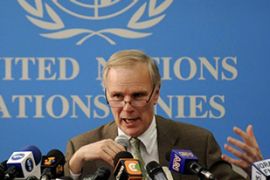Kenya human rights activists killed
Men who accused Kenyan police of running death squads are shot dead in Nairobi.

Organised protests
Kingara and Oulu had mobilised protests on Thursday against what they said was the illegal killing of 1,721 people and the disappearance of 6,542 suspected Mungiki sympathisers.
Njuguna Gitau, a spokesman for Mungiki’s political wing, said the Oscar Foundation had no links with Mungiki.
“These people were innocent, but the [police] killer squad went for them,” he told Reuters news agency.
The two activists met last month Philip Alston, the UN’s special rapporteur on extra-judicial executions, and provided him with testimony on police killings in Nairobi and Central Province.
Alston, who has accused police of carrying out extra-judicial executions on “a regular basis”, has demanded an independent probe into the killing of the Oscar Foundation officials.
“It certainly looks as though the police are the ones with the greatest interest in having killed these two people,” he told Al Jazeera on Friday.
“The police stand pretty heavily indicted of systematic engagement in extra-judicial executions, but to have taken the next step of brutally executing in broad daylight two leading human rights defenders would really raise the stakes to a whole new level.
“My fervent hope is that [it] is not the police that ordered such measures but there seems no real alternative but to bring in external forces to try to investigate and get to the bottom of it.”
‘Serious investigation’
The Kenyan police commissioner, whose sacking has been called for by Alston and the Oscar Foundation, dismissed Alston’s demand for a foreign-led investigation.
|
“The killings may have been carried out to tarnish the reputation of the police force” Hussein Ali, |
“We have investigated many murder cases previously and we will investigate this one with the seriousness it deserves like any other case and it does not, therefore, require that kind of treatment,” Hussein Ali said.
“The killings may have been carried out to tarnish the reputation of the police force.”
After Thursday’s killings, students from the university of Nairobi clashed with police and one student was killed.
Students pushed the activists’ car into the university compound and refused to hand over the bodies to the police who they accused of complicity in the killings.
Police said more than 100 protestors were arrested on Thursday in Nairobi and several other towns across the country.
Mungiki banned
The Mungiki gang presents itself as a quasi-religious organisation whose members are drawn from Kenya’s biggest tribe, the Kikuyu, whose Mau-Mau fighters battled to rid colonial Kenya of the British.
The group was banned in 2002, accused of extortion rackets and gruesome
killings, including beheadings.
It is also alleged of involvement in last year’s deadly violence in the wake of a disputed national election.
A former police driver was shot dead last year after he told the Kenya National Commission on Human Rights he had witnessed over 50 suspects being
executed by police.
In January, a Kenyan journalist who said he had been threatened by officers after writing about police malpractice was found decapitated in a forest.